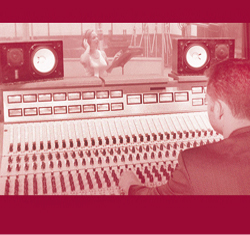
If I have the time and budget, I will continue doing things onto analog, either by premixing and bouncing tracks, or by running a second machine in sync.
However, I still never go over 48 tracks; I set that as my limit. It just gets really difficult to manage more tracks than that, especially if you’re mixing on an analog console.
Don’t forget, we used to quite successfully make records on a single 24-track machine.
How do you know when a recording is complete, when it’s time to stop adding overdubs and start mixing it?
It’s really just instinct. For me it always comes down to one simple question: “Does it sound any good?” Sometimes you run into situations when you suddenly think, “I’m not so sure this sounds good anymore.”
That’s when you realize that the last thing you added didn’t need to be there. “Less is more” sounds like a cliché, but it often is true, and it often takes a lot of effort to have less rather than more.
I actually spend more time pruning stuff down than adding things. Doing so can often require a musician to learn or evolve an altogether different part to be played, so that what was two tracks is now one track.
Every song is different, of course, but I’m always looking for ways to simplify and reduce.
I have one criteria that is probably my bottom line: is it embarrassing or not? If somebody is singing and it’s really out of tune, that to me would sound really embarrassing if you put it out on a record.
A guitar part could be equally embarrassing—the kind of thing you’d play when you were in your first band in school, when you were 13 or 14 and playing a lot of crap.
Something that goes back to the days when the guitar player was focusing so hard on getting the chord shape or string bend right that he couldn’t put any feeling into it.
Those moments are tough for me, because I find myself thinking, “Oh my god, what am I going to tell them?”
What do you tell them?
Well, I hope they’ll come to that conclusion themselves when they hear it played back. Still, I always subscribe to the idea that it’s not my record, it’s the artist’s record; I’m making it for them.
So all I can do is ask the artist, “Are you really happy with that? Or are you going to be embarrassed when you hear that in five years’ time?”
What happens if the artist is happy with a part he’s played but you feel strongly that it’s embarrassing?
I occasionally had that problem with Sting, who sometimes couldn’t be bothered, or thought what he’d done was good enough. Usually I’d just fix it when he wasn’t looking.
Of course, now in Pro Tools you can do things that were unimaginable years ago. I made a record not long ago with a singer who, frankly, was not on the ball—he’d often come in hung over or whatever.
We had the usual problem of time and budget, plus he was physically incapable of improving things sometimes. But somehow, by doing a lot of fiddling around and editing, I was able to make him sound really good.
